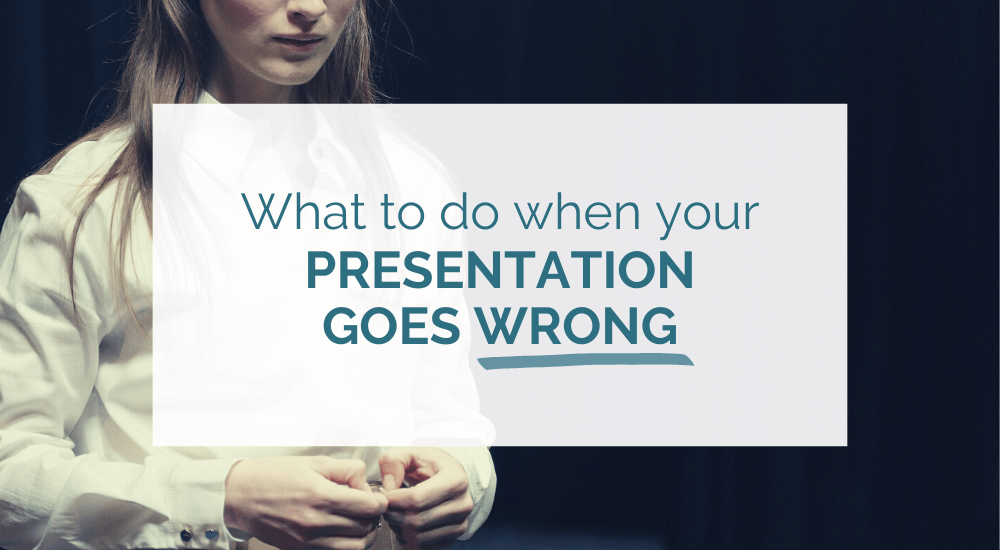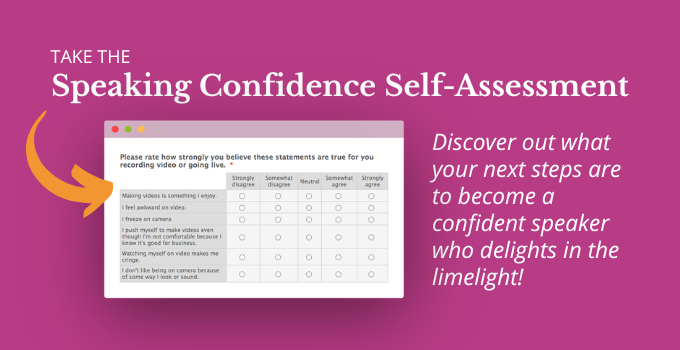Have you ever made a mistake while you were speaking? Or forgotten to mention something you really, really wanted to say? Or perhaps you haven’t done any speaking yet because you’re terrified you will make a mistake?
I know exactly how you feel. The mere thought of speaking in public used to make me want to crawl into a hole. I was afraid of saying the wrong thing, forgetting what I wanted to say, or messing up in some flamboyant way.
But now I’m a public speaker and a speaking confidence coach. And, like every speaker out there, I’ve had my fair share of public speaking fails. The thing is though… they no longer bother me.
What to do when you make a mistake while public speaking Share on XHad a presentation gone wrong? Here’s how to handle it!
In this blog post, I’m going to teach you what to do when your presentation goes wrong, so you can handle any mistakes with confidence, ease, and poise.
It’s possible, I promise!
1. Change your expectations
If you step on stage determined to give a flawless, hilarious, or mind-blowing presentation, you’re setting yourself up for disappointment.
Yes, you can do lots of preparation and calm your nerves beforehand to give yourself the best shot at everything going smoothly. But if you have a rigid idea of what a good presentation looks like, and something goes wrong, you’re going to feel like a failure and label your talk a “public speaking failure.”
Try on Broadway star Idina Menzel’s mindset instead:
“There are about 3 million notes in a two-and-a-half-hour musical; being a perfectionist, it took me a long time to realize that if I’m hitting 75 percent of them, I’m succeeding. Performing isn’t only about the acrobatics and the high notes: It’s staying in the moment, connecting with the audience in an authentic way.”
If a world-class performer like Idina Menzel can accept being imperfect 25% of the time, you can lower your expectations too!
2. Forgive yourself… fast
I was once performing with my women’s group, playing a shekere (an instrument that makes a lot of noise!), when I lost track of where we were. I was supposed to stop playing but I carried on.
When I realized I’d made a mistake, I got flustered and stopped. I felt my body start to drop into that horrible downward spiral of shame.
But instead of going with it and sinking lower and lower, I quickly forgave myself and refocused on the performance.
Someone else who was playing along with me kept playing. The worst of it was that she had a little solo and then I joined back in. We then together signaled to the rest of the group when to join back in, and the group was back on track.
If you make a mistake, don’t allow yourself to wallow in shame and regret. Accept your mistake, forgive yourself fast, and get back to the matter at hand.
3. Keep your energy consistent
Only you know what you planned to say. The audience doesn’t know what you had in mind. So unless you announce it to them, they won’t notice. Or really care.
They definitely don’t want you to go into a tailspin and stall. They just want to learn from you.
So no matter what happens, if you make a mistake or omission, do your best to remain open and in service of your audience. Focus on putting out that positive, generous energy, and give your audience what they came for.
4. Buy yourself time
What if your mind goes blank and you completely forget what you were going to say?
There’s a simple solution to this one: buy yourself some time.
Michael Port, author of Steal the Show and co-founder of Heroic Public Speaking, offers some creative ways to do this.
First, you can take a sip of water or take a long, thoughtful pause while surveying your audience. No one will have a clue that you’re thinking about what to say next. In fact, they might even appreciate the opportunity to digest what you’ve just said.
Alternatively, you can repeat what you just said in the hope that it’ll jog your memory and get you back on track. If you can’t remember your last words, you can even ask your audience, “Where was I just now?” They’ll be pleased to help you out.
5. See mistakes for what they are: signs that you’re human!
You may suddenly realize that you skipped a whole section of your presentation. If you think it’s really important to backtrack and include what you missed out, just stop and say, “Before we go any further, I want you to know X.” Simple.
What if you say something that is the opposite of what you meant? Again, this doesn’t have to be a big deal. Just say, “Did I just say that? That’s not what I meant to say. I meant to say this.”
Making mistakes can have a plus side. They can make you more relatable.
I once was preparing to give a talk at a Rotary Club. At the last minute, I added an extra photo to my slide deck that perfectly illustrated the point I wanted to make.👌

However, when that photo came up during my talk, my mind went completely blank. It was a photo of a desk with papers all over it and a spilled cup of coffee. What on earth was the point I had wanted to make with that?!
I turned to the audience and admitted my quandary. “I can’t for the life of me remember why I put this slide here. But I know it was for a good reason, so just give me a minute to see if it will come to me.”
The audience waited to see what would happen. Would I remember? Would I give up and move on? Either situation would have been fine.
I thought and thought about it. And then, as will sometimes happen, the meaning of the chaotic desk popped back into my consciousness.
“Ah yes,” I said, “another cause of speaking anxiety is not being prepared.”
Everyone burst out laughing.
And then I spotted the irony. 😂
Afterward, the event planner told me that was her favorite moment of the talk because it was exactly the kind of thing she’d do. Making and admitting to that mistake made me more relatable. She even ended up hiring me as her coach!
Everyone makes mistakes. If you handle them with poise and serenity, you show that you’re a normal, flawed person, just like everyone in your audience. And you demonstrate how your audience can handle such a situation too.

Prepare for the inevitable mistakes
As a speaker, your job is to inform and inspire, not to show how perfect you are. Your audience doesn’t require perfection and neither should you.
Rather than worry that you might make a mistake or forget what you want to say, assume that you will, and prepare yourself for these inevitable moments. Envision in your mind these future moments of forgetfulness, and see yourself handling them with equanimity or amusement.
In this way, you can let go of your perfectionist expectations and instead focus on connecting with and serving your audience, whether that’s by sharing information, telling stories… or making a very human mistake. 🙃
Had a presentation go wrong that weighs on you still? Check out my program Throw Off Your Speaking Remorse to free yourself of that vulnerability hangover!
Want to overcome your fear of being seen? Check out my book, Delight in the Limelight.







0 Comments